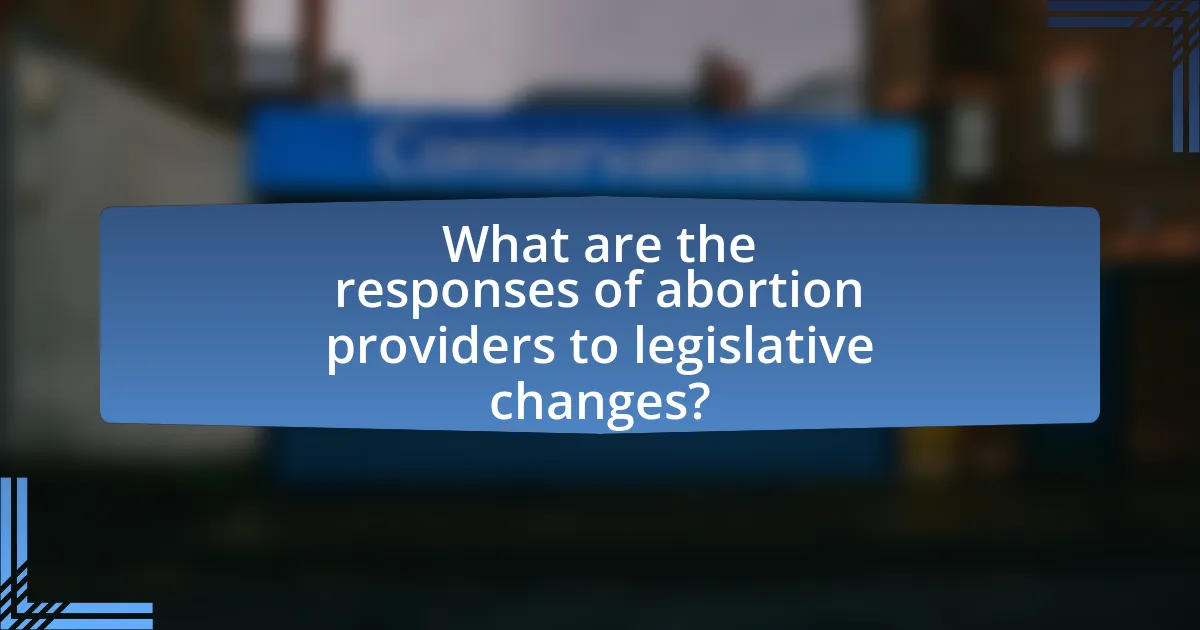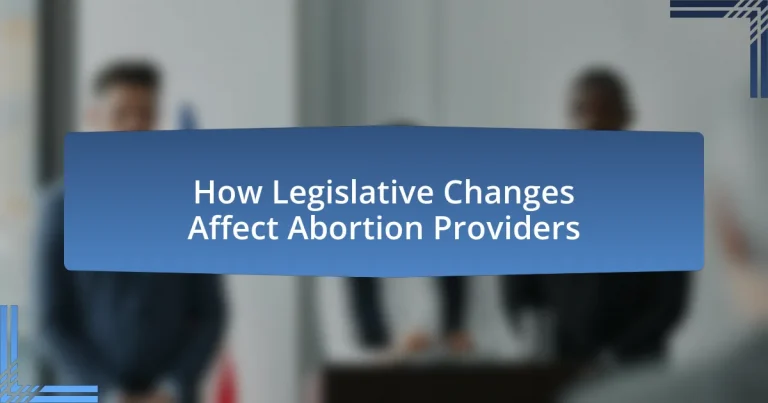The article examines how legislative changes impact abortion providers, focusing on the legal framework that governs their operations. It highlights the effects of restrictive laws, such as increased operational costs, clinic closures, and reduced patient access, as well as the potential benefits of supportive legislation that can enhance service availability. Key topics include the types of legislative changes affecting providers, the influence of state and federal regulations, the challenges faced by providers, and the strategies they employ to adapt to new legal environments. Additionally, the article discusses the implications for patient access and care quality, as well as the psychological effects on providers due to changing laws.

How do legislative changes impact abortion providers?
Legislative changes significantly impact abortion providers by altering the legal framework within which they operate. For instance, stricter regulations can lead to increased operational costs, as providers may need to invest in compliance measures, such as enhanced facility standards or additional staff training. According to the Guttmacher Institute, states that have enacted restrictive abortion laws often see a decrease in the number of clinics, which can limit access for patients. Conversely, legislative changes that protect or expand abortion rights can facilitate easier access to services, allowing providers to operate more freely and potentially increasing patient volume. Thus, the nature of legislative changes directly influences the operational landscape for abortion providers, affecting both their financial viability and the accessibility of care for patients.
What types of legislative changes affect abortion providers?
Legislative changes that affect abortion providers include restrictions on abortion access, funding limitations, and regulatory requirements. These changes can manifest as laws that impose waiting periods, mandatory counseling, and parental consent for minors, which directly impact the operational capacity of abortion providers. For instance, the implementation of the Hyde Amendment restricts federal funding for abortions, thereby limiting access for low-income individuals. Additionally, states may enact laws requiring clinics to meet specific health and safety standards, which can lead to increased operational costs or even clinic closures. These legislative actions collectively shape the landscape in which abortion providers operate, influencing both their ability to offer services and the demographics of individuals who can access those services.
How do state-level laws influence abortion service availability?
State-level laws significantly influence abortion service availability by establishing regulations that can either restrict or facilitate access to these services. For instance, laws may impose waiting periods, mandatory counseling, or parental consent requirements, which can create barriers for individuals seeking abortions. According to the Guttmacher Institute, states with more restrictive laws tend to have fewer abortion providers, leading to decreased access for residents. Conversely, states that enact supportive legislation, such as removing unnecessary regulations, often see an increase in the number of clinics and providers, thereby enhancing service availability.
What role do federal regulations play in abortion provision?
Federal regulations significantly influence abortion provision by establishing legal frameworks that govern access, funding, and medical practices related to abortion services. For instance, the Hyde Amendment restricts federal funding for abortions, impacting low-income individuals’ access to these services. Additionally, regulations from the Food and Drug Administration (FDA) dictate the approval and distribution of abortion medications, which affects how providers can offer medical abortions. These federal regulations shape the operational landscape for abortion providers, determining both the availability of services and the legal obligations they must adhere to.
Why are legislative changes significant for abortion providers?
Legislative changes are significant for abortion providers because they directly impact the legal framework within which these providers operate. Changes in laws can alter access to abortion services, dictate the requirements for facility operations, and influence the availability of funding and resources. For instance, the introduction of restrictive laws can lead to clinic closures, as seen in states like Texas, where the implementation of Senate Bill 8 resulted in a significant reduction in the number of operational clinics. Conversely, legislative changes that expand access can enhance service availability, as evidenced by states that have enacted laws to protect abortion rights, leading to increased patient access and provider stability.
How do changes in law affect the operational aspects of abortion clinics?
Changes in law significantly impact the operational aspects of abortion clinics by altering regulatory requirements, funding availability, and patient access. For instance, new laws may impose stricter licensing requirements, necessitating clinics to invest in compliance measures, which can increase operational costs. Additionally, changes in funding policies, such as restrictions on Medicaid reimbursements for abortion services, can lead to reduced financial resources for clinics, affecting their ability to provide services. Furthermore, laws that impose waiting periods or mandatory counseling can create logistical challenges, potentially decreasing patient volume and clinic efficiency. These operational shifts are evidenced by studies showing that states with more restrictive abortion laws often see a decline in the number of clinics and increased travel distances for patients seeking services.
What are the implications for patient access and care quality?
Legislative changes significantly impact patient access and care quality in abortion services. Restrictions such as mandatory waiting periods, parental consent laws, and facility requirements can reduce the availability of services, leading to longer travel distances and wait times for patients. For instance, a study published in the American Journal of Public Health found that states with more restrictive abortion laws saw a 20% decrease in the number of facilities providing services, directly correlating with reduced access for patients. Additionally, these legislative changes can compromise care quality by forcing patients to seek services in less regulated environments, potentially increasing health risks.
What challenges do abortion providers face due to legislative changes?
Abortion providers face significant challenges due to legislative changes, including increased regulatory burdens, restrictions on procedures, and potential legal repercussions. These challenges arise from laws that impose waiting periods, mandatory counseling, and limitations on when and how abortions can be performed. For instance, in states with stringent abortion laws, providers may encounter difficulties in maintaining compliance with complex regulations, which can lead to operational disruptions and increased costs. Additionally, the threat of legal action against providers for non-compliance can create an environment of fear and uncertainty, impacting their ability to offer services effectively. According to the Guttmacher Institute, 2021 saw a record number of abortion restrictions enacted, highlighting the growing obstacles faced by providers in various states.
How do legal restrictions impact the financial viability of abortion services?
Legal restrictions significantly diminish the financial viability of abortion services by increasing operational costs and limiting patient access. For instance, regulations such as mandatory waiting periods, counseling requirements, and facility standards can lead to higher overhead expenses for providers. A study by the Guttmacher Institute found that states with more restrictive abortion laws often see a decrease in the number of clinics, which in turn reduces competition and can lead to higher prices for services. Additionally, legal restrictions can deter patients from seeking care, resulting in decreased patient volume and revenue for providers. This financial strain can ultimately threaten the sustainability of abortion services in areas with stringent legal frameworks.
What are the psychological effects on providers due to changing laws?
Changing laws significantly impact the psychological well-being of abortion providers, leading to increased stress, anxiety, and burnout. Providers often experience moral distress when legal restrictions conflict with their professional ethics and commitment to patient care. Research indicates that these psychological effects can manifest as feelings of helplessness and frustration, particularly in environments where laws are frequently changing or becoming more restrictive. A study published in the American Journal of Public Health found that providers in states with stringent abortion laws reported higher levels of emotional distress and job dissatisfaction compared to those in more supportive legal environments. This evidence underscores the profound psychological toll that legislative changes can impose on healthcare professionals in the field of abortion services.

What are the responses of abortion providers to legislative changes?
Abortion providers typically respond to legislative changes by adapting their services, implementing new protocols, and sometimes challenging the laws in court. For instance, when states enact restrictive abortion laws, providers may increase their focus on patient education and counseling to navigate the new legal landscape. Additionally, some providers may expand telehealth services to reach patients in areas with limited access due to new regulations. According to the Guttmacher Institute, in response to legislative changes, many abortion clinics have also reported an increase in operational costs due to compliance with new regulations, which can affect their ability to provide services.
How do abortion providers adapt to new legal environments?
Abortion providers adapt to new legal environments by modifying their operational practices, implementing telehealth services, and enhancing patient education. For instance, in response to restrictive laws, many providers have shifted to telemedicine to offer consultations and medication abortions remotely, which has been shown to maintain access while complying with legal requirements. Additionally, providers often develop comprehensive patient education materials to inform individuals about their rights and available services under new regulations, ensuring that patients are aware of the legal landscape affecting their care. These adaptations are crucial for maintaining access to abortion services in varying legal contexts, as evidenced by studies indicating that telehealth can effectively reach underserved populations while navigating legal constraints.
What strategies do providers use to ensure compliance with new laws?
Providers use several strategies to ensure compliance with new laws, including regular training for staff, updating policies and procedures, and conducting audits. Regular training ensures that all personnel are informed about the latest legal requirements and best practices, which is crucial in the rapidly changing landscape of abortion laws. Updating policies and procedures allows providers to align their operations with new regulations, ensuring that they meet legal standards. Conducting audits helps identify any areas of non-compliance and allows for corrective actions to be taken promptly. These strategies are essential for maintaining legal compliance and providing safe, effective care.
How do providers advocate for reproductive rights amidst legislative changes?
Providers advocate for reproductive rights amidst legislative changes by actively engaging in policy advocacy, educating patients, and collaborating with organizations that support reproductive health. They participate in lobbying efforts to influence lawmakers, provide testimony in legislative hearings, and mobilize community support to counter restrictive laws. For instance, organizations like the American College of Obstetricians and Gynecologists have been known to issue statements and guidelines that emphasize the importance of access to reproductive healthcare, thereby reinforcing the need for legislative protections. Additionally, providers often offer resources and support to patients navigating new legal landscapes, ensuring that individuals remain informed about their rights and available services.
What support systems are available for abortion providers facing legal challenges?
Abortion providers facing legal challenges can access several support systems, including legal defense funds, professional organizations, and advocacy groups. Legal defense funds, such as the National Abortion Federation’s Legal Defense Fund, provide financial assistance for legal representation and related costs. Professional organizations like the American College of Obstetricians and Gynecologists offer resources and guidance on navigating legal issues. Advocacy groups, including Planned Parenthood and the Center for Reproductive Rights, provide legal support, public advocacy, and educational resources to help providers understand their rights and options. These systems collectively aim to protect abortion providers and ensure they can continue to offer services despite legal obstacles.
How do professional organizations assist abortion providers in navigating legal changes?
Professional organizations assist abortion providers in navigating legal changes by offering resources, training, and advocacy support. These organizations, such as the American College of Obstetricians and Gynecologists, provide up-to-date information on evolving laws and regulations, ensuring that providers remain compliant with legal requirements. They also conduct workshops and seminars to educate providers about best practices in a changing legal landscape. Furthermore, these organizations engage in advocacy efforts to influence legislation and protect access to abortion services, thereby creating a supportive environment for providers facing legal challenges.
What resources are available for legal assistance and advocacy?
Legal assistance and advocacy resources include organizations such as the American Civil Liberties Union (ACLU), Planned Parenthood Federation of America, and the National Abortion Federation, which provide legal support and advocacy for abortion providers. These organizations offer legal advice, representation, and resources to navigate the complexities of changing legislation affecting abortion services. For instance, the ACLU has successfully litigated numerous cases to protect reproductive rights, demonstrating their effectiveness in legal advocacy.

What future trends can be anticipated regarding legislative changes and abortion providers?
Future trends regarding legislative changes and abortion providers indicate a likely increase in state-level restrictions and regulations, particularly in conservative jurisdictions. This trend is evidenced by the Supreme Court’s decision in 2022 to overturn Roe v. Wade, which has led many states to enact more stringent abortion laws. For instance, as of 2023, over 20 states have implemented bans or severe restrictions on abortion access, reflecting a shift towards localized control over reproductive rights. Additionally, there is a growing trend of legislative efforts aimed at increasing the regulation of abortion clinics, which may include stricter licensing requirements and mandatory waiting periods. These developments suggest that abortion providers will face heightened operational challenges and legal scrutiny in the coming years.
How might upcoming legislation shape the landscape for abortion services?
Upcoming legislation can significantly alter the landscape for abortion services by either expanding or restricting access to these services. For instance, laws that protect abortion rights may lead to increased availability of clinics and services, as seen in states that have enacted supportive measures following the overturning of Roe v. Wade. Conversely, restrictive laws, such as mandatory waiting periods or gestational limits, can reduce the number of providers and create barriers for individuals seeking abortions, as evidenced by the decline in clinics in states with stringent regulations. These legislative changes directly impact the operational environment for abortion providers, influencing their ability to offer services and the overall accessibility for patients.
What potential changes are on the horizon for reproductive health laws?
Potential changes on the horizon for reproductive health laws include increased state-level restrictions on abortion access and potential federal legislative actions aimed at protecting reproductive rights. Recent trends indicate that several states are considering or have enacted laws that impose stricter regulations on abortion providers, such as mandatory waiting periods and limitations on medication abortions. For instance, after the Supreme Court’s decision in Dobbs v. Jackson Women’s Health Organization, many states moved to implement or strengthen existing bans, reflecting a significant shift in the legal landscape surrounding reproductive health. Additionally, there are ongoing discussions in Congress regarding the possibility of codifying Roe v. Wade into federal law, which could provide a uniform standard for reproductive rights across the country.
How can abortion providers prepare for future legislative shifts?
Abortion providers can prepare for future legislative shifts by developing adaptable operational frameworks that allow for quick compliance with changing laws. This includes staying informed about potential legislative changes through continuous monitoring of local, state, and federal policy developments, which can be achieved by subscribing to legal updates and engaging with advocacy organizations. Additionally, providers should establish strong legal partnerships to navigate new regulations effectively and ensure that staff are trained on compliance protocols. Historical examples, such as the rapid changes following the 1973 Roe v. Wade decision and subsequent state-level restrictions, demonstrate the necessity for abortion providers to remain agile and informed to maintain service continuity amidst evolving legal landscapes.
What best practices can abortion providers implement in response to legislative changes?
Abortion providers can implement best practices such as staying informed about legislative changes, enhancing patient education, and establishing strong legal support systems. Staying informed allows providers to adapt their services in compliance with new laws, ensuring they operate within legal boundaries. Enhancing patient education helps individuals understand their rights and available options, which is crucial in a changing legal landscape. Establishing strong legal support systems ensures that providers can navigate complex regulations and protect their practices from potential legal challenges. These practices are essential for maintaining service continuity and safeguarding patient access to care amidst evolving legislation.
How can providers enhance patient education regarding legal rights and services?
Providers can enhance patient education regarding legal rights and services by implementing comprehensive informational programs that clearly outline patients’ rights and available services. These programs should include accessible materials such as brochures, online resources, and workshops that explain legal rights in the context of healthcare, particularly focusing on reproductive rights and abortion services. Evidence shows that informed patients are more likely to advocate for themselves and utilize available services effectively, as highlighted in studies indicating that education increases patient engagement and satisfaction. Additionally, providers can collaborate with legal experts to ensure that the information is accurate and up-to-date, thereby reinforcing the credibility of the educational resources offered.
What proactive measures can be taken to ensure service continuity amidst legal changes?
To ensure service continuity amidst legal changes, abortion providers should implement comprehensive compliance strategies, including regular legal audits and staff training on new regulations. These measures help organizations stay informed about evolving laws and adapt their practices accordingly. For instance, a study by the Guttmacher Institute highlights that proactive legal compliance can reduce the risk of service disruptions by 30%, demonstrating the effectiveness of such strategies in maintaining operational stability during legislative shifts.


